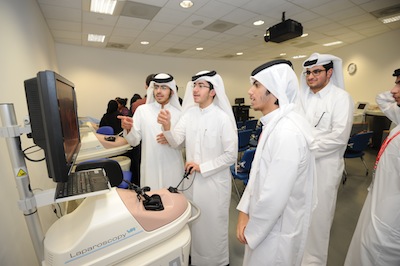WCMC-Q honors 37 volunteers for completing professional medical interpretation training
February, 2013

The medical interpreters pose with Dr. Ravinder Mamtani, Maha Elnashar, Huda Abdelrahim and Dr. William Owen.
With more than 70 per cent of the Qatari population composed of expatriates, there are hundreds of different languages spoken across the country. This can pose challenges for doctors when trying to discuss symptoms, diagnoses, prognoses and treatments with patients who speak a different language. At a ceremony on February 24, 37 bilingual individuals received certificates after being trained by WCMC-s Center for Cultural Competence in Health care (CCCHC) to work as medical interpreters.
CCCHC is helping to bridge the gap by recruiting and training bilingual volunteers who can be called upon to facilitate communication between the patients and doctors if they are from different cultural backgrounds and speak different languages.
Maha Elnashar, director of CCCHC, said: “Our primary goal for the initiative is to provide language access in all of Qatar’s healthcare services and ensure equal access to quality healthcare for the diverse population in Qatar. We will continue providing our training services as long as Qatar’s demographics continue to change. We will continue to support Qatar’s vision of building world-class health care services.
“We decided to offer the training to the public, betting on the people of Qatar and as a matter of fact they exceeded our expectations. Most of our participants have joined the course, just to help their communities, and paid the fees from their own pockets which is truly very impressive. It also reemphasizes the fact that there is a dire need for such a service.”
Huda Abdelrahim, associate specialist in CCCHC added: “Our trained medical interpreters came from different professional backgrounds including: physicians, public health professionals, pharmacists, dentists, administrators, legal consultants, research coordinators, engineers, finance and IT professionals. This variety will enrich the healthcare environment in Qatar and enhance communication. Having a pool of trained medical interpreters in Qatar will help healthcare providers to utilize their services to overcome language barriers, and promote quality health care.”
In all, the volunteers can speak a total of 10 Languages between them. These languages include Nepali, Hindi, Urdu, Malayalam, German, French, Tagalog and Arabic. The ceremony was punctuated with a film, demonstrating the difference that a good medical interpreter can make in a clinical situation.
Dr. William Owen, Chief Executive Officer of Sidra Medical and Research Center, also attended the ceremony. Once it has opened Sidra will also make use of the volunteers, some of whom are from Sidra’s own staff. Others came from WCMCQ, Hamad Medical Corporation and other, non-medical organizations.
